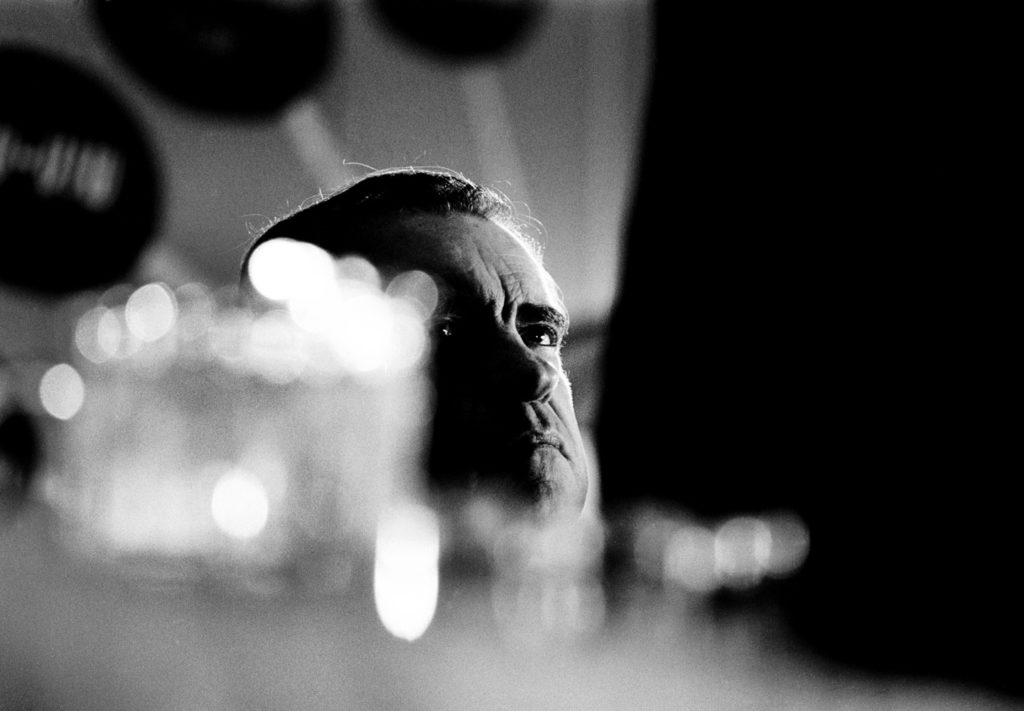Kennerly’s Watergate Photo Gallery
This is the 50th anniversary of the break-in at the Democratic National Committee headquarters at the Watergate Office Building. It led to the resignation of President Richard Nixon.
This image of Martha Mitchell was John F. Kennedy, Jr’s favorite political photo. I took it in 1970. Martha was the wife of Attorney General John Mitchell and known as, “The Mouth of the South.” She couldn’t help talking to the press, and gave them some of her husband’s secrets. President Richard Nixon blamed her for his troubles. He told David Frost in an interview, “If it hadn’t been for Martha, there’d have been no Watergate.” Her husband John, (behind her here), left Martha in 1973, and was convicted of conspiracy, obstruction of justice and perjury. He spent 19 months in prison. “It could have been a hell of a lot worse,” he said, “They could have sentenced me to spend the rest of my life with Martha.”
Republican Sen. Howard Baker and chairman of the Senate Watergate Committee Democrat Sen. Sam Ervin. Howard Baker had the most memorable line from the hearings when he asked witness John Dean, ‘What did the president know, and when did he know it?”
Former CIA officer E. Howard Hunt testifies before the committee. He was convicted of burglary, conspiracy, and wiretapping. Hunt spent 33 months in prison for his Watergate antics.
Not related to Watergate, but contributing to Nixon’s problems, was the resignation of Vice President Agnew on Oct. 10, 1973. Two days later House Minority Leader Gerald R. Ford was nominated to replace Agnew, and less than a year later would replace Nixon.
Watergate Special Prosecutor Archibald Cox leaves a press conference after the Nixon Administration refused to give him the White House tapes. He said, “I’m not looking for a confrontation… I’m certainly not out to get the President of the United States.” The next night, on October 20th, 1973, in what became known as the “Saturday Night Massacre” Nixon ordered Attorney General Elliott Richardson to fire special prosecutor Cox. He refused and resigned. Nixon then ordered Deputy Attorney General William Ruckelshaus do it, and he also resigned. Robert Bork became acting AG, and carried out the command.
That night I rushed to Special Prosecutor Cox’s office to get photos, but was blocked by an FBI agent from entering the room. It made an even better picture.
On December 6, 1973, Gerald R. Ford was sworn in as Vice President of the United States. President Nixon was there to congratulate him on the floor of the House in the U.S. Capitol.
A man holds an “Impeach Nixon” sign in front of the White House as supporters of the president pass behind him. The nation was in turmoil over the Watergate affair.
Former Attorney General John Mitchell walks past a protester after appearing before Judge John Sirica at the U.S. District Court in Washington, D.C.
Famed Washington Post reporters Bob Woodward and Carl Bernstein leave the U.S. District Court while covering the Watergate trial. They were the ones who broke the Watergate story.
Republican first-term Congressman from Maine William S. Cohen broke with his party over Watergate and joined Democrats in demanding the Nixon White House tapes in 1973. He also voted to impeach Nixon. Cohen thought his fledgling political career was dead. “I had come to the conclusion based on all of the hate mail I had gotten, all of the flak I had gotten, that I wasn’t coming back,” recalled Mr. Cohen, who had been elected less than a year earlier. “I was O.K. with that.” Rather than cratering his career he went on to three terms in the Senate and became President Clinton’s secretary of defense. Liz Cheney is the William Cohen of today, her political future unclear. Her heroism is not in question, however.
Young attorney Hillary Rodham with Judiciary Committee chief counsel John Doar during the House impeachment hearings at the U.S. Capitol. On July 27-30, 1974, members of the Democratic-led Judiciary Committee approved three articles of impeachment against Nixon. He resigned before they reached the House floor for a vote.
President Richard Nixon waves goodbye as he boards his helicopter after announcing his resignation, August 9, 1974. He remains the only president to resign.
My cover picture on TIME Magazine of Gerald R. Ford after he became the 38th President of the United States. In his remarks after being sworn into office he declared, “Our long national nightmare is over.”

